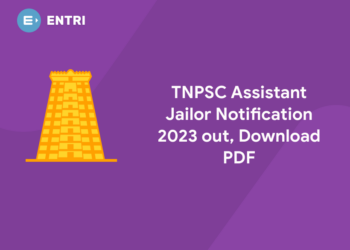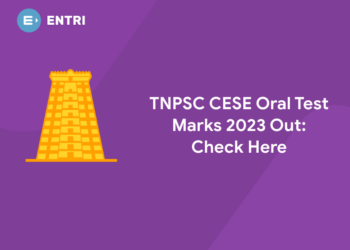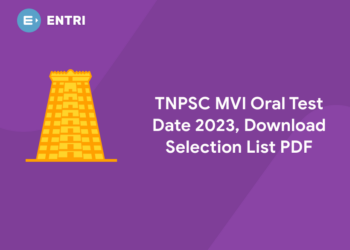Tamil Nadu Public Service Commission invites application from candidates belonging to Hindu Religion for recruitment to the post of Executive Officer included in both Group VII B and Group VIII Services. Interested candidates shall apply online through the official website of the Commission. (http:/www.tnpsc.gov.in, http://www.tnpscexams.net, http://www.tnpscexams.in)
A proper understanding of the syllabus enables you to score high in any competitive exam. Entri here provides you with the detailed syllabus and exam pattern of both Group VII B and VIII Services.
Exam Pattern for TNPSC Group VII B and VIII Services
The written examination of both Group VII B and VIII consists of 2 papers, each of which consists of 200 questions to be answered in 3 hours.
Paper I of Group VII B consists of
- General Studies -75 questions of Degree Std
- Aptitude and Mental Ability Test – 25 questions of SSLC Std
- General Tamil /General English -100 questions of SSLC Std
The Paper II of Group VII B includes 200 questions on 1.Hindu Religion and 2.Saivism and Vaishnavism.
Paper 1 of Group VIII consists of
- General Studies – 75 questions of S.S.L.C Std
- Aptitude and Mental Ability Test – 25 questions of S.S.L.C Std
- General Tamil /General English – 100 questions of SSLC Std
The Paper II of Group VIII consists of 200 questions of SSLC standard on 1.Hindu Religion and 2. Saivism and Vaishnavism.
There shall be an Oral test ( Interview and Records) for 80 marks for selection to both Group VII B and Group VIII Services.
Syllabus for TNPSC Group VII B Services
The syllabus for General Studies for Group VII B Services (Degree Standard) includes
Unit I General science
Physics: Electricity and Magnetism, ‐Heat, light and sound‐Atomic and nuclear physics – Universe‐General Scientific laws‐Scientific instruments‐Inventions and discoveries‐National scientific laboratories‐Science glossary‐Mechanics and properties of matter‐Physical quantities, standards and units
Chemistry: Chemistry of ores and metals‐Carbon, nitrogen and their compounds‐
Fertilizers, pesticides, insecticides-Elements and Compounds‐Acids, bases and salts‐Oxidation and reduction
Botany: Nutrition and dietetics‐Respiration Main Concepts of life science‐The cell‐basic unit of life‐Classification of the living organism
Zoology: Blood and blood circulation‐Endocrine system‐Reproductive system‐
Genetics the science of heredity‐Environment, ecology, health and hygiene, Bio‐
diversity and its conservation‐Human diseases‐Communicable diseases and non
communicable diseases‐ prevention and remedies
Unit II Current Events
India and its neighbours‐Appointments‐who is who? -HistoryLatest diary of events – National ‐National symbols‐Profile of States‐Eminent persons & places in news‐Sports & games‐Books & authors ‐Awards & honours‐ Latest historical events
Welfare oriented government schemes, their Utility-Political Science Problems in conduct of public elections‐ Political parties and political system in India‐ Public awareness & General administration‐ Role of Voluntary organizations & Govt.
Geography – Geographical landmarks‐Policy on environment and ecology Economics Current socio‐economic problems‐New economic policy & govt. sector Science-Latest inventions on science & technology‐Latest discoveries in Health Science‐Mass media & communication
Unit III Geography
Earth and Universe‐Solar system‐Atmosphere hydrosphere, lithosphere‐Natural vegetation‐Forest & wildlife‐Agricultural pattern, livestock & fisheries‐Transport including Surface transport & communication‐Monsoon, rainfall, weather and climate‐Water resources ‐rivers in India‐Soil, minerals & natural resources‐Social geography – population‐density and distribution‐Natural calamities – disaster management
Unit IV History and culture of India
India since independence‐Characteristics of Indian culture‐Unity in diversity –race, colour,language, custom‐India‐as secular state‐Organizations for fine arts, dance, drama, music‐Growth of rationalist, Dravidian movement in TN‐Political parties and populist schemes‐ Prominent personalities in the various spheres – Arts, Science, literature and Philosophy – Mother Teresa, Swami Vivekananda, Pandit Ravishankar , M.S.Subbulakshmi, Rukmani Arundel and J.Krishnamoorthy etcSouth Indian history‐Culture and Heritage of Tamil people‐Advent of European invasion‐Expansion and consolidation of British rule‐Effect of British rule on socio‐economic factors‐Social reforms and religious movements
Unit V INDIAN POLITY
Constitution of India‐. Preamble to the constitution‐ Salient features of constitution‐ Union, State and territory‐ Citizenship‐rights amend duties‐ Fundamental rights‐ Fundamental duties‐ Human rights charter‐ Union legislature – Parliament‐ State executive‐ State Legislature – assembly ‐ Local government – panchayat raj – Tamil Nadu‐ Judiciary in India – Rule of law/Due process of law‐ Indian federalism – center – state relations‐ Emergency provisions‐ Elections ‐ Election Commission Union and State‐ Amendments to constitution‐ Schedules to constitution‐. Administrative reforms & tribunals‐ Corruption in public life‐ Anti‐corruption measures – Central Vigilance Commission, lok‐adalats, Ombudsman, Comptroller and Auditor General of India‐ Right to information ‐ Central and State Commission‐ Empowerment of women
Unit VI Indian economy
National income‐ Rural welfare oriented programmes‐ Social sector problems – population, education, health, employment, poverty‐HRD – sustainable economic growth‐ Economic trends in Tamil Nadu ‐Energy Different sources and development‐ Finance Commission ‐Planning Commission‐ National Development Council-Nature of Indian economy‐Need for economic planning‐Five‐year plan models‐an assessment‐Land reforms & agriculture‐Application of science in agriculture- Industrial growth‐Capital formation and investment‐Role of public sector & disinvestment‐Development of infrastructure
Unit VII Indian national movement
Role of Tamil Nadu in freedom struggle ‐ Rajaji, VOC, Periyar, Bharathiar & Others‐Birth of political parties /political system in India since independence- Early uprising against British rule‐1857 Revolt‐ Indian National Congress‐ Emergence of national leaders‐Gandhi, Nehru, Tagore, Nethaji ‐Growth of militant movements -Communalism led to partition
Unit VIII Aptitude & Mental Ability Test
Ratio and Proportion‐Simple interest‐Compound interest‐Area‐Volume‐Time and Work‐ Decision making and problem-solving Logical Reasoning‐Puzzles‐Visual Reasoning‐Alpha numeric Reasoning‐Number Series‐Logical Number/Alphabetical/Diagrammatic Sequences‐Conversion of information to data‐Collection, compilation and presentation of data ‐ Tables, graphs, diagrams‐ Analytical interpretation of data ‐Simplification‐ Percentage‐Highest Common Factor (HCF)‐Lowest Common Multiple (LCM)
Syllabus for TNPSC Group VIII Services
The syllabus for General Studies for Group VIII services (SSLC standard) includes
UNIT I General science :
Physics: Force, motion and energy ‐ Magnetism, electricity and electronics ‐ Heat, light and sound Nature of Universe ‐ General Scientific laws ‐ Inventions and discoveries-National
scientific laboratories ‐ Mechanics and properties of matter-Physical quantities, standards and units
Chemistry: Fertilizers, pesticides, insecticides -Elements and Compounds-Acids, bases and salts
Botany: Nutrition and dietetics-Respiration Main Concepts of life science ‐ Classification of the living organism
Zoology ‐ Environment, ecology, health and hygiene ‐Blood and blood circulation ‐ Reproductive system ‐ Human diseases, prevention and remedies ‐ Animals, plants and human life
UNIT II Current Events
History ‐ Latest diary of events‐national ‐ National symbols ‐ Profile of States ‐ Eminent persons & places in news-Sports & games-Books & authors ‐ Awards & honours’ ‐ India and its neighbours -Political Science ‐ Problems in conduct of public elections ‐ Political parties and political system in India ‐ Public awareness & General administration ‐ Welfare oriented govt. schemes, their utility –Geography ‐ Geographical landmarks ‐ Economics ‐ Current socio‐economic problems -Science ‐ Latest inventions on science & technology
UNIT III Geography
Water resources ‐ rivers in India ‐ Soil, minerals & natural resources ‐ Forest & wildlife -Earth and Universe ‐ Solar system‐ Monsoon, rainfall, weather & climate‐ Agricultural pattern ‐Transport & communication ‐ Social geography – population‐density and distribution ‐Natural calamities – Disaster Management.
UNIT IV History and culture of India and Tamil Nadu
Indus valley civilization ‐ Guptas, Delhi Sultans, Mughals and Marathas ‐ Age of Vijayanagaram and the bahmanis ‐ South Indian history-Culture and Heritage of Tamil people‐ India since independence-Characteristics of Indian culture-Unity in diversity –race, colour, language, custom ‐ India‐as secular state ‐ Growth of rationalist, Dravidian movement in TN ‐Political parties and populist schemes.
UNIT V INDIAN POLITY
Constitution of India ‐ Preamble to the constitution ‐ Salient features of constitution ‐ Union, state and territory ‐ Citizenship‐rights amend duties ‐ Fundamental rights ‐Fundamental duties ‐ Human rights charter ‐ Union legislature – Parliament ‐ State executive ‐State Legislature – assembly ‐ Local government – panchayat raj – Tamil Nadu ‐ Judiciary in
India – Rule of law/Due process of law – Elections ‐ Official language and Schedule‐VIII ‐
Corruption in public life ‐ Anti‐corruption measures –CVC, lok‐adalats, Ombudsman = Right to information ‐ Empowerment of women ‐ Consumer protection forms
UNIT VI INDIAN ECONOMY
Nature of Indian economy ‐ Need for economic planning ‐ Five‐year plan models‐an assessment ‐ Land reforms & agriculture ‐ Application of science in agriculture ‐ Industrial growth ‐ Rural welfare oriented programmers ‐ Social sector problems –population, education, health, employment, poverty ‐ Economic trends in Tamil Nadu
UNIT VII INDIAN NATIONAL MOVEMENT
National renaissance ‐ Emergence of national leaders ‐ Gandhi, Nehru, Tagore ‐ Different modes of agitations ‐ Role of Tail Nadu in freedom struggle Rajaji, VOC, Periyar, Bharathiar & others
UNIT VIII APTITUDE & MENTAL ABILITY TESTS
Conversion of information to data‐Collection, compilation and presentation of data ‐ Tables, graphs, diagrams ‐ Analytical interpretation of data ‐ Simplification‐ Percentage ‐Highest Common Factor (HCF) ‐ Lowest Common Multiple (LCM) ‐ Ratio and Proportion-Simple interest-Compound interest – Area – Volume ‐ Time and Work -Logical Reasoning – Puzzles ‐Visual Reasoning ‐ Alphanumeric Reasoning ‐ Number Series.
About Entri
Entri is an award-winning online platform which helps students to prepare for various competitive examinations and keeps them updated on various exam schedules. Practice question papers and mock tests for Kerala PSC, SSC CHSL, SSC CGL, IIT JEE Mains, NEET, KEAM, and Comedk are available for students to know where they stand and prepare accordingly. Doubt forums are also made available to students to provide a platform for them to interact with experts and clear all their doubts and queries. A suitable app to help you stand out in various competitions.
Entri wishes all the candidates the very best for the upcoming examination!











